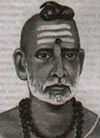Poonthanam

Poonthanam (Malayalam: പൂന്താനം) (1547–1640AD) was a famous devotee of Guruvayurappan, who lived in Keezhattoor in (Malappuram district), Kerala, India. He is remembered for his masterpiece, Jnanappana which means 'the song of wisdom' in Malayalam. Jnanappana has been transcreated into English by poet cum writer Dr Gopi Kottoor, the book "Poonthanam's Hymns - The Fountain Of God" is published by Writer's workshop Calcutta.[1] Poonthanam was the family name, his personal name is not known.[2]
Early life
Poonthanam was born in 1547 in the month of masi on the day of Aswini, at Keezhattoor, near Perinthalamanna in Malapuram district,into a Namboodiri Brahmin family. He married at 20, but for a long time, they had no children. He began to propitiate the Lord of Guruvayur by reciting the ‘[Santhana Gopalam]’ and a son was born. He called for a celebration and everybody known was invited, but the child died an hour before the Annaprasanam ceremony.[3] Grief-stricken, Poonthanam sought refuge at Guruvayur and started praying with the puranic story of Kumaraharanam. The heartbroken Poonthanam, it is said, was consoled by Guruvayurappan himself, who lay down on his lap, for a moment, as a child. He considered Lord Krishna as his son and achieved enlightenement. In the Jnanappana he writes: "While little Krishna is dancing in our hearts, do we need little ones of our own?". Poonthanam spent the rest of his life reading the Bhagavatham and singing the Lord's glories in simple Malayalam. His magnum opus, the Jnanappana, was composed during this period.[2] His house, the Poonthanam Illam is now under the Guruvayur Devaswom.[4]
Poonthanam and Melpathur
He was a contemporary of Melpathur Narayana Bhattathiri, another famous poet associated with Guruvayur. Melpathur, the author of the Sanskrit work Narayaneeyam, was a famed scholar who refused Poonthanam's request to read his Jnanappana, a work in Malayalam.[5] Legend has it that Guruvayurappan, impressed by Poonthanam's humility and devotion preferred his works to those of Bhattathiri's and once even rebuked Bhattathiri for ignoring Poonthanam’s Santhanagopala Paana saying He preferred Poonthanam’s genuine bhakti to Bhattathiri’s vibhakti.[6]
Bhakti
Poonthanam preached Namasmaranam, or the constant remembrance of the Lord's name, as the only way to reach Him. He emphasised the futility of material existence and advocated instead service to the Lord through the Nama japa, or recitation of the names of the Lord, as the path to moksha. At the end of each verse of the Jnanappana, the nama japa of ‘Krishna Krishna Mukunda Janardhana,’ stresses Poonthanam's emphasis on nama sankeerthanam.[7]
Death
According to legend, Poonthanam left this world in his body in 1640. When he announced his departure for heaven, he invited anyone who wanted to join him, which all the villagers declined. Ultimately, only a maid who had been nursing his ailing wife joined him on his heavenly journey.[3][6]
See also
References
- ↑ "Transcreating Poonthanam". The Hindu, August 2002. Retrieved 2007-08-25.
- ↑ 2.0 2.1 http://www.guruvayurdevaswom.org/spoonthanam.shtml
- ↑ 3.0 3.1 "Devotee the Lord loved". The Hindu. July 20, 2012.
- ↑ "Steps to develop Poonthanam Illam". The Hindu. Jul 14, 2006.
- ↑ "Stage for Bhakti". The Hindu. September 17, 2010.
- ↑ 6.0 6.1 "To lovers of Krishna, in Tamil". The Hindu. July 19, 2012.
- ↑ "Rendered with devotion". March 13, 2009.
External links
- http://www.celextel.org/stotras/other/jnanapana.html
- http://india.deepthi.com/who-is-who-kerala/poonthanam.html
- http://www.vaikhari.org/downloads.html Vaikhari Digital Archive - Works of Poonthanam in Malayalam PDF
- Poonthanam Day in Guruvayur